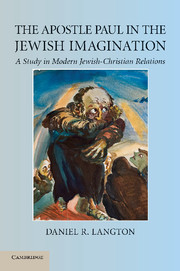Book contents
- Frontmatter
- Contents
- Acknowledgments
- Introduction
- PART I THE APOSTLE PAUL AND POPULAR JEWISH CULTURAL IDENTITY
- PART II THE APOSTLE PAUL AND JEWISH RELIGIOUS IDENTITY: NEW TESTAMENT STUDIES AND THEOLOGICAL APPROACHES
- PART III THE APOSTLE PAUL AND JEWISH INTEREST IN THE JUDEO-CHRISTIAN TRADITION: ARTISTIC AND LITERARY APPROACHES
- 5 An Oratorio by Felix Mendelssohn, a Painting by Ludwig Meidner, and a Play by Franz Werfel
- 6 The Novels of Shalom Asch and Samuel Sandmel
- PART IV THE APOSTLE PAUL AND JEWISH CRITIQUES OF THE PLACE OF RELIGION IN SOCIETY: PHILOSOPHICAL AND PSYCHOANALYTICAL APPROACHES
- Conclusion
- Appendix: The Story of Abbu Gulish in The Book of Tales
- Bibliography
- Scripture and Other Ancient Writings Index
- General Index
- References
6 - The Novels of Shalom Asch and Samuel Sandmel
Published online by Cambridge University Press: 07 May 2010
- Frontmatter
- Contents
- Acknowledgments
- Introduction
- PART I THE APOSTLE PAUL AND POPULAR JEWISH CULTURAL IDENTITY
- PART II THE APOSTLE PAUL AND JEWISH RELIGIOUS IDENTITY: NEW TESTAMENT STUDIES AND THEOLOGICAL APPROACHES
- PART III THE APOSTLE PAUL AND JEWISH INTEREST IN THE JUDEO-CHRISTIAN TRADITION: ARTISTIC AND LITERARY APPROACHES
- 5 An Oratorio by Felix Mendelssohn, a Painting by Ludwig Meidner, and a Play by Franz Werfel
- 6 The Novels of Shalom Asch and Samuel Sandmel
- PART IV THE APOSTLE PAUL AND JEWISH CRITIQUES OF THE PLACE OF RELIGION IN SOCIETY: PHILOSOPHICAL AND PSYCHOANALYTICAL APPROACHES
- Conclusion
- Appendix: The Story of Abbu Gulish in The Book of Tales
- Bibliography
- Scripture and Other Ancient Writings Index
- General Index
- References
Summary
North American Jewish novels of the mid-twentieth century were largely concerned with explorations of identity and in particular with tensions between secular society and Jewish tradition. A number of high-profile writers appeared to have set themselves in opposition to their Jewish heritage. In the eyes of many, authors such as Chaim Potok (1929–2002), Saul Bellow (1915–2005), and especially Philip Roth (1933–) appeared to be committed to the demystification of Judaism and the deconstruction of Jewish life, revealing it warts and all and emphasising its disoriented secularism. Although some interpreted this phenomenon as an attempt to normalise the Jewish people, many others believed that they went too far in undermining Jewish values. One literary critic recalled that the ‘Jewish book-buying public were shocked and hurt to find [Jewish] writers representing their institutions as shams, their communities suffused with pettiness, spite, lust, hypocrisy, and pretence’. Mordecai Kaplan, founder of Reconstructionist Judaism and himself highly critical of unreflective loyalty towards Jewish tradition, believed that the impact of North American Jewish literature had had a highly detrimental effect on Jewish life in North America in general:
[T]hanks for the most part to the Jewish self-hating attitude of the intellectual elite among our Jewish writers, our Jewish masses are likely to become, at best, only marginal Jews, and at worst, drop outs.
Certainly, many works of literature published in the decades around the midcentury were concerned to formulate North American Jewish cultural identity in painfully secular terms.
- Type
- Chapter
- Information
- The Apostle Paul in the Jewish ImaginationA Study in Modern Jewish-Christian Relations, pp. 210 - 230Publisher: Cambridge University PressPrint publication year: 2010



